
Ted is a wildlife biologist who has worked extensively in the management of wildlife species and their habitat, as well as species at risk recovery throughout his 35 year career with the Ontario Ministry of Natural Resources. In particular he has worked extensively on Woodland Caribou recovery, where he was co-chair of a regional caribou management team as well as the provincial recovery team, and led development of the provincial Caribou Conservation Plan, and Peregrine Falcon recovery, where he was the lead for provincial recovery efforts for almost two decades and provincial representative to the national recovery team. He has also worked for several decades on big game management including Moose harvest and habitat management, White-tailed Deer and Black Bear, and has conducted research on songbird habitat, woodland raptors, and White-tailed Deer. He has coordinated many workshops and task teams focussed on addressing specific identified wildlife and species at risk challenges. Ted has continued to work in species at risk recovery, wildlife inventory and environmental assessment projects in recent years. Ted is a lifelong birder and natural historian who has contributed to and/or helped to coordinate many voluntary wildlife monitoring programs.

Kim is a fisheries/aquatic biologist with over 33 years experience working for the Ministry of Natural Resources & Forestry. Kim has worked across the province in a variety of capacities from Fisheries Assessment, Fisheries Research, Regional Specialist, and lastly as Provincial Lead for Aquatic Monitoring. He worked in several roles from Technician to Manager but spent most of his career as a Senior Biologist. Kim also worked in the Waterpower Program as Regional Coordinator for Northwest Ontario. Kim has worked for other agencies throughout his career which has provided experience working on all the Canadian Great Lakes as well as in the Arctic. Kim has worked on streams, rivers, and lakes of all sizes examining habitat and fish populations. Kim has strong data and analytical skills including Bayesian analysis. He also has extensive experience in the design of individual aquatic projects and large aquatic monitoring programs. He was part of the small Science and Policy group that proposed and designed Ontario’s Broad-scale Monitoring Program (Aquatics). During the past number of years, he chaired the Provincial Science Team that was responsible for the ongoing implementation and refinement of that program. Kim has worked on, or headed, many Regional or Provincial working groups that have led to the advancement of fisheries management across the province.
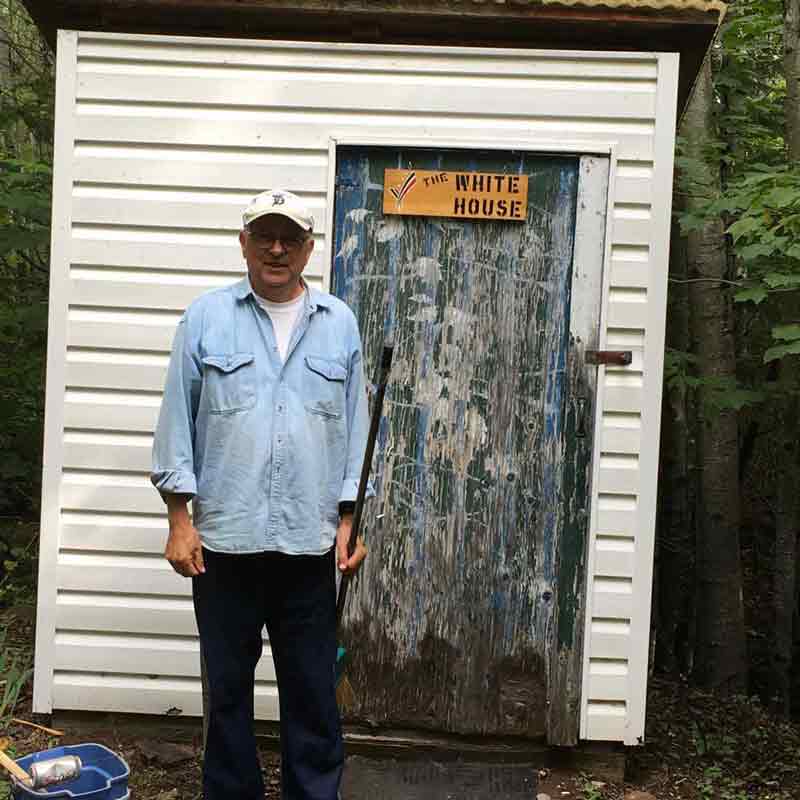
Research Scientist Emeritus and past Fellow of the American Institute of Fisheries Research Biologist. World authority on the biology and management of percid fishes, primarily walleye. Over 40 years research experience in industry, academics and government. Past Senior Scientist (PM 20,21) Walleye Research Unit Leader and Aquatics and Tourism Effects Coordinator, Centre for Northern Forest Ecosystem Research. Over 30 years experience as a research scientist with the U. S. Fish and Wildlife Service and the Ontario Ministry of Natural Resources investigating and reviewing Great Lakes issues including, status of the walleye stocks in the Great Lakes, massive alewife mortalities, thermal discharges, eutrophication, and other water quality problems. Chaired, edited, coordinated or published in several major international symposia including SCOL, PERCIS I, ASPY sponsored by the Great Lakes Fishery Commission, the International Joint Commission, etc. Author of over 30 scientific papers in the primary literature, plus additional reviews, administrative and technical reports. Other experience includes Consultant to Woods Hole Oceanographic Institution, State of Montana, State of Wisconsin on fisheries issues; member of a peer review team selected by the U.S. National Academy of Sciences to assess the quality and vitality of the U.S. (NOAA) oceanic research and development program; Research Associate, Dept. of Environmental and Industrial Health, University of Michigan; adjunct Professor, Dept. of Biology, Lakehead University; and participant in scientific workshops in Finland and Poland. Listed in American Men and Women of Science, Who's Who in the Midwest, Who's Who in the East and Dictionary of International Biography, Community Leaders and Noteworthy Americans.
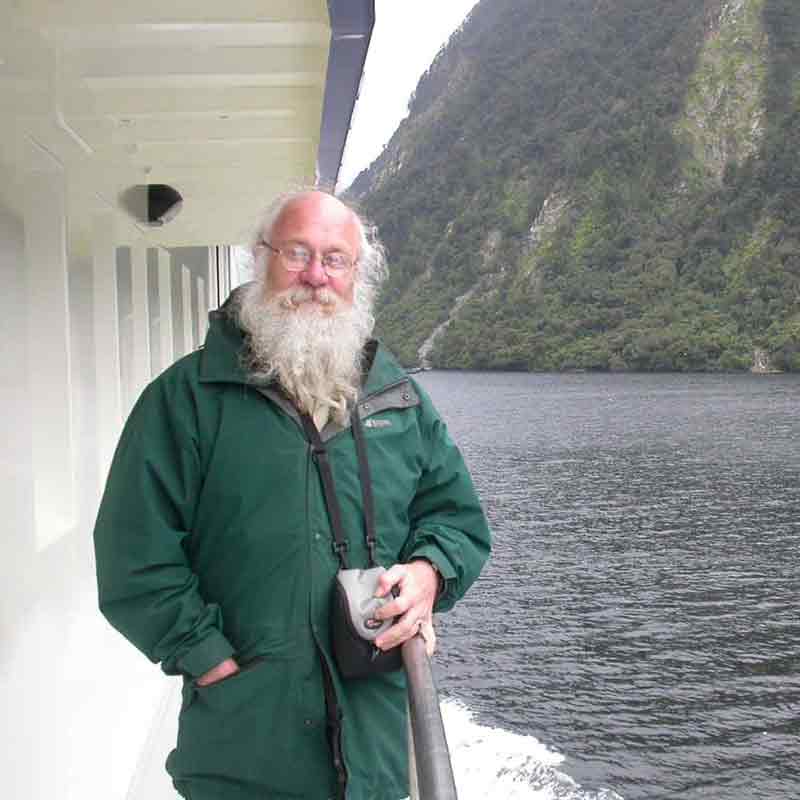
Dr. Ken Deacon has worked as an aquatic entomologist since 1972. He has been based in Thunder Bay since 1981 and has focused on the aquatic macroinvertebrates of northwestern Ontario. He is the author/co-author of 22 papers/reports. His research projects have recently focused on aquatic macroinvertebrates as indicators of water quality and on West Nile Virus in the Thunder Bay District. Dr. Deacon has been involved in aquatic macroinvertebrate community baseline studies in Thunder Bay harbour, North Trout Creek, Lake Nipigon, the Nipigon River, Clearwater Creek, Dona Lake, the Namakan River, and Lac Des Iles. He has worked on the recovery of aquatic communities in Nipigon Bay, Lake Superior and on the water chemistry in the lakes of northwestern Ontario as affected by acid deposition, pulp and paper mills, or mine effluent.
Co-founder of Northern Bioscience, now an associate, Al Harris is a biologist with over 30 years experience in northern Ontario. In 1996, after spending seven years as a biologist with Ontario Ministry of Natural Resources, he co-founded Northern Bioscience, an ecological consulting company based in Thunder Bay, Ontario. He has conducted life science inventory in over 60 protected areas in northern Ontario, 38 wetland evaluations, and was Canadian co-lead on wetland monitoring on the Rainy Lake – Namakan system for the International Joint Commission and at Isle Royale National Park. He is senior author of the Wetland Ecosystem Classification for Northwestern Ontario and co-author of Terrestrial and Wetland Ecosites for Northwestern Ontario and Wetland Plants of Ontario. Al has contributed to environmental assessments for seven mine projects, 10+ hydroelectric projects, two wind farms, three major transmission lines, and six solar projects in northern Ontario. He was a member of the Committee on the Status of Species at Risk in Ontario (2009 - 2014) and is currently a member of the Committee on the Status of Endangered Wildlife in Canada (COSEWIC). He holds a B.Sc. in Wildlife Biology from the University of Guelph and a M.Sc. from Lakehead University.
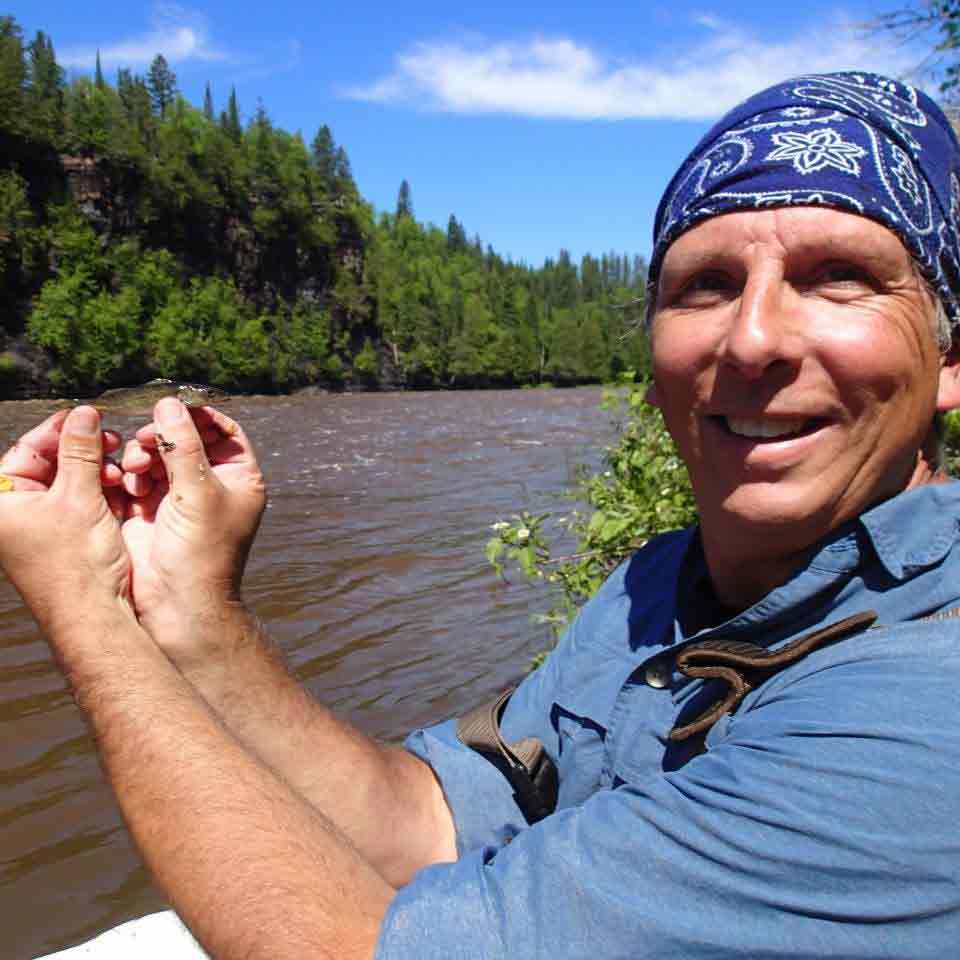

Mike has 30 years experience in the planning and management parks and protected areas (Parks Canada, Ontario Parks, OMNR), specifically in the areas of natural history research and interpretation as well as park and interpretive facility design. He is a former Pukaskwa National Park interpretive naturalist and canoeist on the White River. Mike's company, Imagineering is involved in natural heritage and outdoor recreational projects in northeastern and northwestern Ontario

Terry is a seasoned biologist specialized in the field of fisheries and aquatic science. Through his 35 year career with the Ontario Ministry of Natural Resources, he contributed greatly to the development of this science and its application to fisheries management and policy across the province. In recent years, he has been assisting the private sector with their environmental needs. He has extensive knowledge of the aquatic resource and the users of this resource, particularly within the boreal region of northern Ontario. He is an expert in the design of field programs for baseline aquatic inventory and monitoring needs including fish population assessment, quantitative studies of aquatic invertebrates and plants, and angler creel surveys. Terry’s primary area of expertise lies in the analysis, interpretation and reporting of data. He is skilled in the manipulation of large datasets, the use of statistics, and spatial analytical techniques as they relate to this particular field. His resume boasts an impressive list of reports and scientific publications.
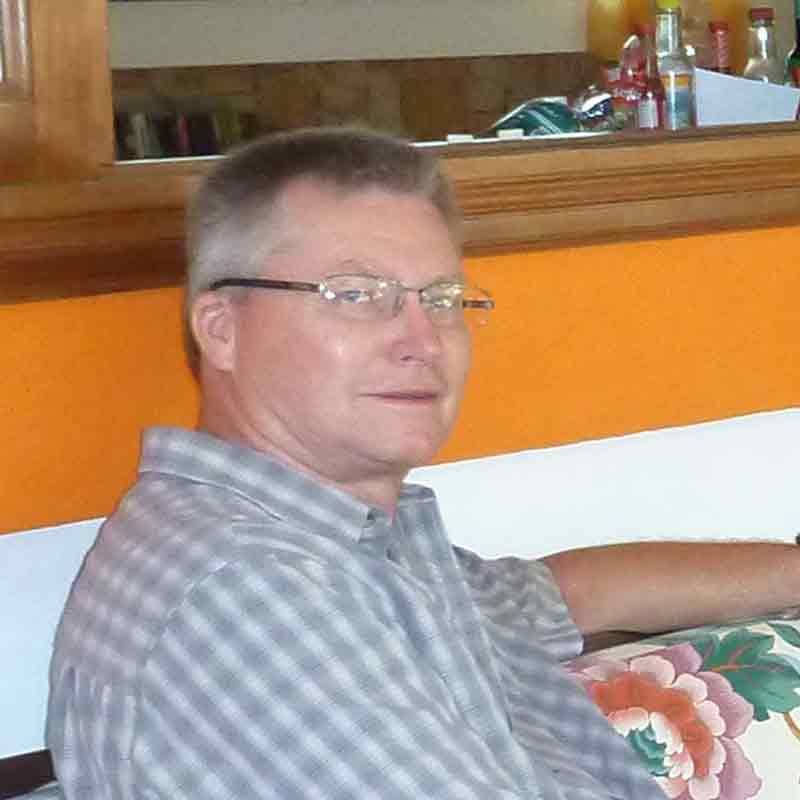
Tom is a biologist with over 38 years of experience in the areas of fisheries assessment, management and research. Tom has worked with teams across the province and throughout North America on a variety of aquatics related topics. His area of expertise lies in stock assessment, fish community dynamics and, the design and implementation of aquatics monitoring surveys. He has chaired both provincial and international working groups on sturgeon and contributed to recovery planning for this species throughout Ontario and the Arctic- Prairie drainages. He has extensive experience in assessing aquatic invasive species, fish habitat availability and quality, and identifying degrees of risk associated with land use and developments around water.
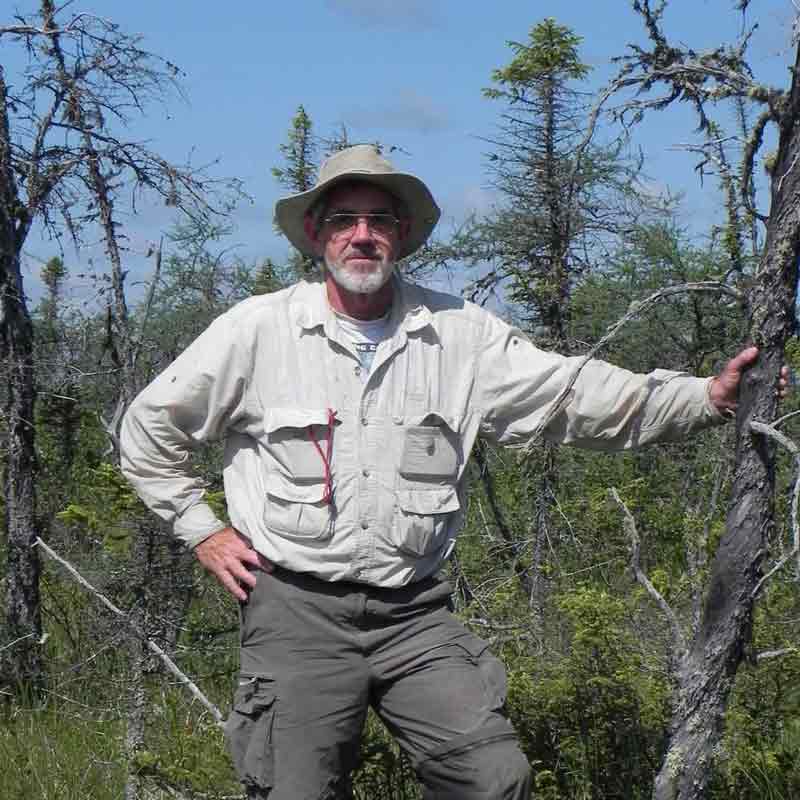
Gerry Racey is retired from the Ontario Ministry of |Natural Resources and Forestry after a 39 year career working with terrestrial and wetland ecosystems. He has extensive field, policy and implementation experience in ecological land classification, wildlife and forest management. Gerry has extensive experience in coordinating and delivering field surveys and assessments of woodland caribou across their range including in the Far North of Ontario. He coordinated Ontario’s Far North Caribou Project, range assessment activities, led development of the range assessment protocol and of range assessment reports. He was a key player in development and implementation of Ecological Land Classification development in northwestern Ontario. He has led field sampling programs including in the far north, major training initiatives across sectors, and played a key role in developing field guides and practical field management tools (Wetland Ecosystem Classification for Northwestern Ontario, Terrestrial and Wetland Ecosites of Northwestern Ontario, Northwestern Ontario Forest Ecosystem Interpretations, Wetland Plants of Ontario), and a host of land classification tools for forest planning, inventory, wood supply, silviculture, diversity, wildlife habitat and wetland conservation. Gerry has deep rooted experience and skills in working across the disciplines of forestry and wildlife, and implementing assessment protocols for forest renewal, wildlife habitat, road and linear feature renewal and rehabilitation, forest inventory, caribou populations and habitat, forest soils and plant communities. He has many years of experience in training and technology transfer to professionals, interdisciplinary groups, First Nations, and field crews, and in group facilitation of interdisciplinary groups addressing ecological topics.
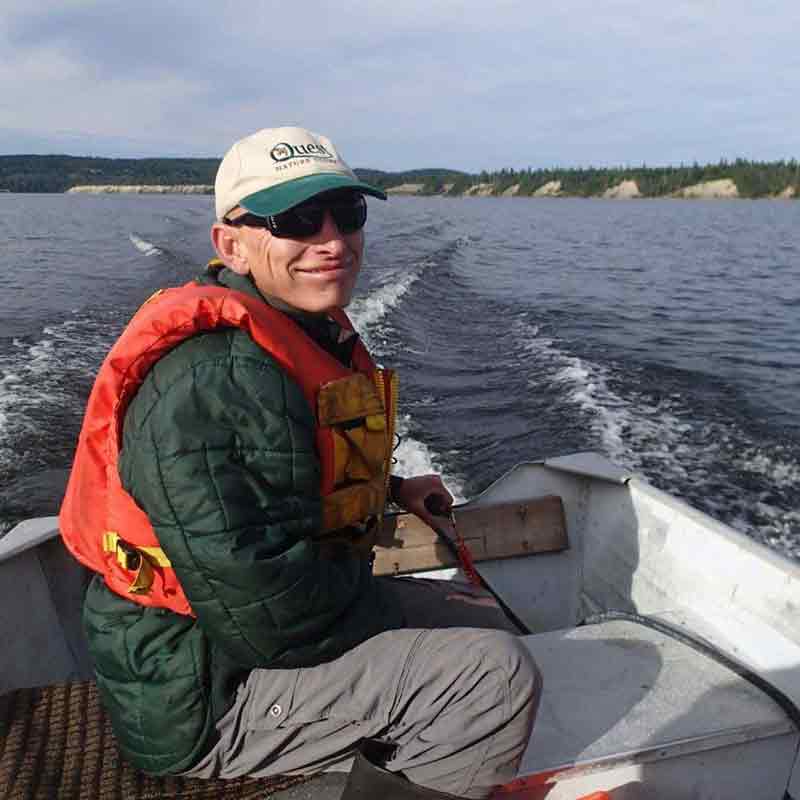
Brian Ratcliff is a wildlife biologist with more than 25 years of experience. Research projects conducted for both federal and provincial agencies, have mainly focused on threatened and endangered species of birds such as Piping Plovers, American White Pelicans Peregrine Falcons, and Burrowing Owls. He spent 15 years setting up and building wildlife rehabilitation centres in Ontario, Quebec and Manitoba. Since moving to Northwestern Ontario, Brian has worked as a private consultant on contracts for Parks Canada, Canadian Wildlife Service, Ontario Ministry of Natural Resources, Geomatics International, and Northern Bioscience. Contracts have involved data collection on Northern Pike, Lake Sturgeon, Smallmouth Bass, threatened and endangered species, breeding bird monitoring, bird migration monitoring, and land ownership information for the National Marine Conservation Area on Lake Superior. Currently, Project Coordinator of Project Peregrine (Thunder Bay Field Naturalists) that monitors the recovery of peregrine falcons nesting in Northern Ontario, and also bands young peregrines at cliff nest sites
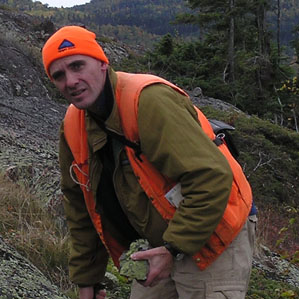
Mark Smyk retired from the Ontario Public Service in 2019 as Senior Manager, Resident Geologist Program, after spending more than 30 years in the Ontario Geological Survey (OGS). In his earlier roles as a District Geologist, Regional Resident Geologist and Northwest Regional Manager, Mark acquired extensive, field-based knowledge of the bedrock and glacial geology of northwestern Ontario and the local mineral exploration and mining sector. This experience was complemented by his previous work as a field mapper in the exploration industry. Mark has been a Sessional Lecturer in geology at both Confederation College and Lakehead University and is also a Professional Associate with Lakehead's Department of Geology. He is still actively engaged in scientific research in the Thunder Bay area and has co-authored over 25 peer-reviewed papers and reports, 50 abstracts, 20 field guidebooks and dozens of OGS publications and maps. His interest in public education has led to collaborative projects with organizations such as Ontario Parks, Parks Canada, Thunder Bay Field Naturalists, Great Lakes Aquarium, Natural Resources Canada, and Canadian Lighthouses of Lake Superior, as well as many magazines. His efforts in collecting and providing geoscience information to a variety of client groups have been recognized. Mark has been awarded the Samuel Goldich Medal from the Institute on Lake Superior Geology, the Amethyst Award from the Ontario Public Service and the Distinguished Service Award from the Northwestern Ontario Prospectors Association.

Dr. Thompson's primary field expertise lies in mammalogy and herpetology, and he has broad experience from the boreal to tropical environments. Currently based in Victoria on British Columbia's Vancouver Island, Ian has a keen interest in island biogeography and protected areas.
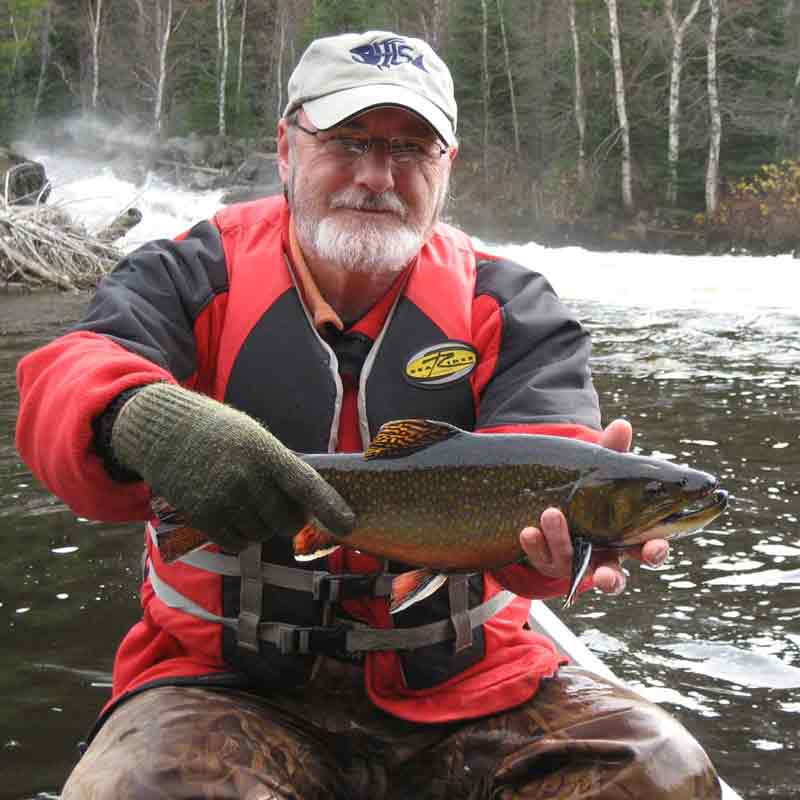
Mr. Tost has over 25 years of consulting and government experience as a biologist in the field of fisheries and fisheries assessment. Jon's background includes extensive work in project planning, experimental design, data collection, and interpretation of information requirements for environmental assessments (EA's) related to hydroelectric developments and other municipal and industrial projects that may impact on the aquatic and terrestrial environments. Mr. Tost has also worked on numerous projects involving fish habitat assessment and mitigation/compensation agreements and he is knowledgeable of the federal Fisheries Act. Through many of the projects he has worked on, Mr. Tost has developed experience in fish habitat restoration, enhancement and creation in relation to aquatic habitats including lakes, large rivers and streams. Prior to starting North Shore Environmental in 1984, Mr. Tost worked for 11 years as both a fisheries technician and fisheries biologist for a number of OMNR district offices and fisheries assessment units in northern and southern Ontario. In the past few years, Mr. Tost has completed a number of professional development courses and continues to expand his knowledge on fisheries assessment and aquatic habitat modification and design.